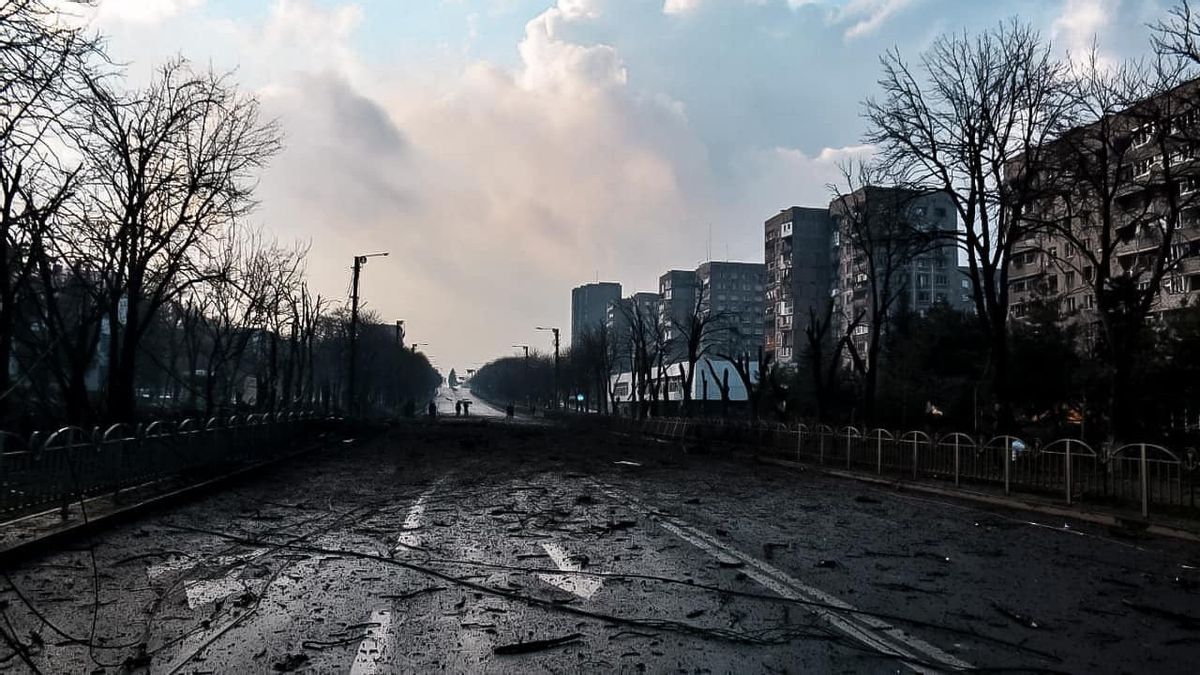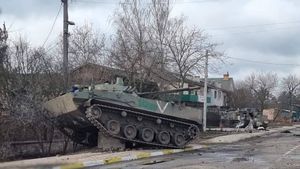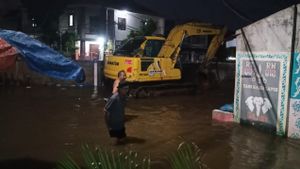JAKARTA - Shelter from bomb explosions and basic survival rituals among the rubble of ruins has become a daily picture of life in Mariupol, Ukraine in recent times.
Uncollected bodies wrapped in blankets, coats, or available covers lie in a yard cleared of debris. Those killed were often buried in public graves.
All around is the black shell of the sprawling tower block typical of Soviet-era residences. Bent metal on balconies, broken windows, wood, metal, and other debris strewn between buildings and on the streets.
Some 400.000 people have been trapped in the strategic port city on the Sea of Azov for more than two weeks, sheltering from heavy bombardment that has cut off power, heating, and water supplies, according to local authorities.
Russia's defense ministry said on Friday its troops were "tightening the ropes" around Mariupol and the fighting had reached the city center.
With no running water or heating, the women crouched around the grill, cooking whatever they found. As Spring drew near, there was no more melting snow to drink.

Residents said no one expected this in post-Soviet Ukraine, the unrelenting assault of what was once considered the 'Russian Brotherhood, although some have lived through other upheavals that rocked the country back under Soviet rule.
"He has a Russian passport, Russian citizenship, lots of medals," said Alexander, 57, pointing to the clearing where his wife's mother's body lay for now.
"My mother-in-law was born in 1936. She survived the siege of Leningrad. She is an honorable worker in fish farming in the Russian Federation. So there she is."
Officials in Mariupol say 2.500 people have been killed since Russian troops stormed across the Ukrainian border on February 24.
Meanwhile, Donetsk Governor Pavlo Kyrylenko said on Friday some 35.000 residents had managed to leave the city in recent days, many on foot or in convoys of private cars, as Russian shelling subsided for some time.
Those who left were sometimes almost in despair, cold, and anxious about the increasing death toll.
"I feel bad. I don't want to blame anyone, but I'm disgusted and scared. And I'm cold. I just have no words. I wasn't ready for my life to be like this," said a woman named Olga.
Russia denies targeting civilians and accuses Kyiv of using them as human shields, something Ukrainian officials deny.
Mariupol is seen as a strategic gift for Russian occupiers to create a bridge between Crimea, which Moscow annexed in 2014, and two separatist enclaves in eastern Ukraine.
A maternity hospital was bombed last week, sending patients fleeing into the street. A theater used to protect families forced from their homes was also hit, although the word "children" was written outside in large enough letters for pilots to read (Russian warplanes).

A sense of solidarity among residents who fear for their lives began to be felt. Strangers accept other foreigners.
"We spent two days in the basement. He couldn't move. I didn't think he would survive," said a middle-aged resident, pointing to his elderly mother.
"Then we managed to leave the cellar. It's the first time I've seen these people. But they protected us. And here we are sitting here, covered in blankets. It's very cold in here. We just want to go home. look at these children, they do not understand."
"Don't worry, my dear. Everything will be fine," said a young mother without a smile, hugging her two school-age children.
In the courtyard, a group of men wandered aimlessly, surveying the destroyed buildings. And all around them lay corpses. The only identifier was a slip of paper, which was added to the temporary cross, each bearing the name and date of birth and death. And there is no indication of when they will be collected.
Sunday was another day of horror and confusion in Mariupol, a port city in eastern Ukraine that has seen some of the heaviest bombing and fighting since Russia began its invasion on February 24.
"The bombs didn't kill them but all this, the situation, the basement, the lack of physical activity, the stress, also the cold," explained resident Andrei.
Nearby, several bodies lay covered in dirty blankets. Some people trudged along carrying their belongings in plastic bags or cardboard boxes. A boy pushes a supermarket trolley past a bombed car.
Andrei said he and his friends were advised by the Ukrainian military to keep the bodies in cold cellars, but these were already filled with people sheltering from Russian artillery and missile attacks.

"I hope there will be some kind of reburial and this is only temporary," he added, pointing to a hole in the ground.
To note, some 400.000 people have been trapped in the strategic port city on the Sea of Azov for more than two weeks, with little if any access to water, food, heating, or electricity, local authorities said.
Ukrainian President Volodymyr Zelensky said on Saturday the Russian siege of Mariupol was "a terror that will be remembered for centuries to come".
SEE ALSO:
Meanwhile, Russia's Defense Ministry blamed "Ukrainian nationalists" on Sunday for what it called a "humanitarian catastrophe" in Mariupol, giving the city until early Monday to surrender. It said 59.000 people had been evacuated from Mariupol in the past three days, the TASS news agency reported.
Some parts of the city are controlled by Russian troops and some remain under Ukrainian control, so residents are not aware of the fate of relatives living in other districts.
Natalia, a kindergarten worker, says she lives with her children and cannot return to her own flat across town.
"No news, no information. Everything is ruined... We don't know how we are going to live now," he lamented.
The English, Chinese, Japanese, Arabic, and French versions are automatically generated by the AI. So there may still be inaccuracies in translating, please always see Indonesian as our main language. (system supported by DigitalSiber.id)


















